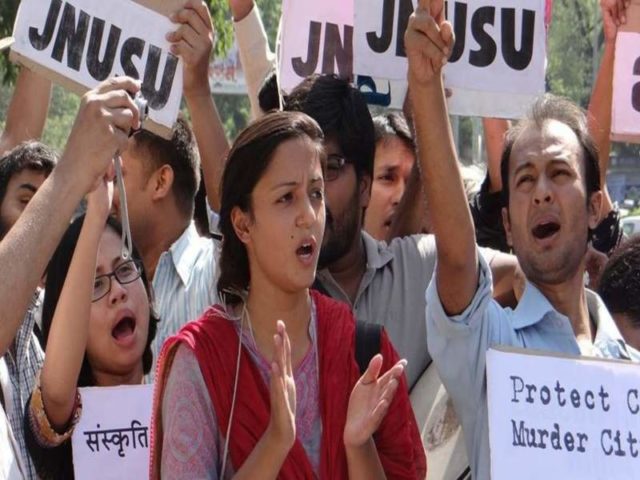By Anam Seraj
It has been deemed necessary, now more than ever, to answer the most heated argument of recent political scenario of India- Who is a nationalist and who isn’t?
Who Is A Nationalist?
“A person who strongly identifies with their own nation and vigorously supports its interests, especially to the exclusion or detriment of the interests of other nations.”
So while a Google search result gave the above definition, our political leaders have a slightly different dictionary.
If you plan on becoming a nationalist, all you need to do is to praise the Government for all its fair-unfair actions, since the BJP Spokesperson, Dr. Sambit Patra said, “Modiji Desh ke Baap hai!” which is acceptable since Congress couldn’t get the time to officially declare Mahatma Gandhi as the ‘Father of the Nation’.
JNU SEDITION CASE
The Jawaharlal Nehru University sedition case popularly known as the ‘Kanhaiya Kumar sedition case’ has been a news hour debate topic of “Nationalism vs Anti Nationalism”.
While the JNU student union leader Kanhaiya Kumar and his comrades including Umar Khalid were released on interim bail by the court declaring the (un)-popular video proctored, a new 1200 pages charge sheet has been filed again by the Delhi police after 3 years of the incident.
While the right-wing never stopped branding the JNU students as ‘Tukde-Tukde’ gang, the left wing and sources close to the union are claiming that the witnesses have a close link to the student wing of BJP, ABVP.
Moreover, there is no direct evidence against Kanhaiya Kumar and most of the JNU students. While the judgment is still awaited, there are some important questions that can be raised.

Why did the Delhi Police file a charge sheet 3 years after the incident?
The fact not only raises questions on the credibility of the charge sheet but also the incompetence of the department to have taken three long years to file a charge sheet on a sedition case.
Is the entire incident politically timed right before the elections?
How coincidental is the fact that the charge sheet was filed right before the Lok Sabha 2019 elections which would again draw the attention of the masses towards the ‘Anti nationalism’ debate?
Why was the Delhi police in a hurry to file the chargesheet without procuring requisite sanctions?
There are a number of questions that can be raised on this case but the most important of them is:
Should Freedom of Expression be restricted?
Related: Demystified: Can EVMs Really Be Hacked?
According to Article 19 of the India Constitution, every citizen has the right to express his views, opinions, belief, and convictions freely by word of mouth, writing, printing, picturing or in any other manner.
The Supreme Court held that the freedom of speech and expression includes Right to demonstration or picketing but not right to strike.
However, the State can impose reasonable restrictions on the exercise of freedom of speech and expression on the grounds of sovereignty and integrity of India, security of the states, public order, decency or morality, contempt of court, defamation, and incitement to an offense.
Sedition cases have a history dating back to the Wahabi Movement in 1870 during British India. There were restrictions on the freedom of expression during British India to stifle the voices of the Nationalist Movement against the British Government.
However, restrictions on Freedom of expression in free India have been a debatable topic ever since the foundation of the Indian Constitution.
The Supreme Court, thus, in the judgment of ‘Kedarnath Singh vs State of Bihar’ gave precedence to Freedom of Speech over sedition unless it incites people to violence.
CRITICISING THE GOVERNMENT MEANS CRITICISING THE NATION?
In a democratic nation, it’s not only the right but the moral duty of a responsible citizen of the country to critically analyze the Government of its nation so as to keep a check on its proper functioning towards nation building.
As citizens of the country, our Constitution has bestowed upon us via Universal Adult Franchise, the Right to Vote.
A vote decides the 5 year future of the country hence, a political discussion of opposite views creates a positive space for questioning in the the popular interest of the country.
There’s a phrase “You don’t have to love the Government to love your country”. There can be nothing more ‘Anti- Nationalistic’ than a biased citizen with a blind outlook, out there to troll on social media with a certificate of ‘Nationalism’ ready to give people the visa of Pakistan for being ‘sickular’ or probably just waiting for women to be raped for using her Freedom of Expression.
As a citizen of a Nation, why am I answerable to anyone to prove my nationalism and patriotism towards MY country?
Image Credits: Google Images
Sources: Hindu, NDTV, Indian Express + more
You May Also Like To Read:
Demystified: What Is Citizenship Amendment Bill And Why Is It Causing Protests In The North-East?































